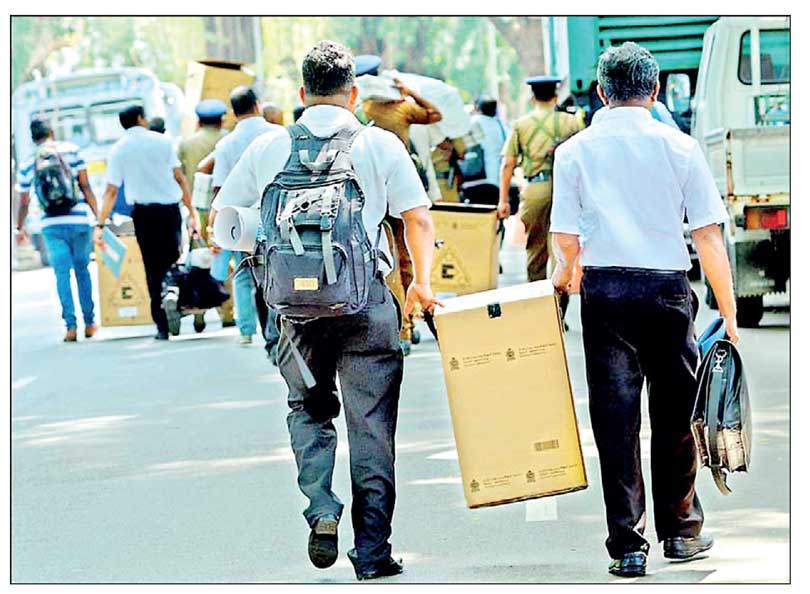Monday Feb 16, 2026
Monday Feb 16, 2026
Tuesday, 18 June 2024 00:02 - - {{hitsCtrl.values.hits}}

Citizens should demand that candidates and political parties participating in these elections present clearly articulated policy platforms that will enable the electorate to make an informed choice at the polls – Pic by Shehan Gunasekara
 Background
Background
The Presidential and possible parliamentary elections are expected to take place later in 2024 and will be the most important set of elections in our post-Independence history. Sri Lanka can come out of the prevailing economic and political crises only if leaders and citizens are willing to recognise that the economy will have to grow by at least 6% per annum for the next 10 years, which is twice the growth rate projected by Sri Lankan authorities and international economists at the moment.
At the presently forecasted growth rates, Sri Lanka will be forced to restructure its debt at regular intervals and muddle through for the foreseeable future. Social instability is also likely to continue and may even worsen, and our youth will have no future in this country. Citizens should demand that candidates and political parties participating in these elections present clearly articulated policy platforms that will enable the electorate to make an informed choice at the polls.
While many Sri Lankans speak and complain about corruption, its root cause lies in the fact that Government and politics pervade every facet of our day-to-day lives. The first step towards fighting corruption is to reduce the size of the Government. Small government is good governance.
Every crisis presents an opportunity, and every cloud has a silver lining. This could be the moment to change direction. To achieve this goal, Sri Lanka must think beyond the box and discard old paradigms, prejudices, and mindsets. With this in mind, 14 suggested prerequisites to guide the country in a new and fresh direction are outlined below. These policy points could provide food for thought to aspiring presidential candidates and political parties as they prepare their respective policy platforms.
Downsizing Government:
1. Abolish the Executive Presidency and replace it with a Parliamentary model with a first-past-the-post electoral system.
2. Create an effective Upper House in the legislature that will focus on national integration and reconciliation, social equity, and levelling up among districts within the country.
3. Abolish Provincial Councils and empower local councils. The number of local councils should be reduced, and a district-level coordination mechanism should be established.
4.Reduce the size and scope of Government on a predetermined timeline. Increase the role of the private, non-governmental, and social sectors. All Government ministries, departments, and agencies should be evaluated on zero-based budgets. Superfluous entities should be closed down. All bureaucratic obstacles and impediments to speedy decision-making should be removed. To help minimise corruption, increase transparency, and facilitate interaction between citizens and Government, technology should be used, wherever possible.
Economic growth and reforms – taxes, the workforce and infrastructure:
5. Modernise and reform the economy to achieve a growth level of at least 6% annually. This should include large-scale privatisation and all necessary reforms that will increase competitiveness and productivity to facilitate rapid export-led economic growth fuelled by foreign investment. Sri Lanka will also have to follow niche market-based strategies for exports. This, too, will require a strong focus on new technologies and skills development.
6. Develop a workforce fit for a competitive, outward-looking economy by upgrading education, training and skills development.
7. Achieve inclusive and regionally balanced growth by modernising agriculture and promoting SMEs, particularly by facilitating their links to domestic and international supply chains.
8. Announce a clear timeline to reduce the highest personal and corporate income tax rates to 20% and VAT to 10%. Property, wealth, and inheritance taxes should not be implemented. Import controls should be lifted, and customs duties should be reduced to make Sri Lanka a globally competitive economy. Sri Lanka should also, with minimum delay, establish a network of free-trade agreements globally and, through this process, become the primary logistics and trading hub for our region. The country should astutely navigate to position itself advantageously, taking into consideration present geopolitical realities and their impact on international trade, investment, and supply chains.
9. Implement a large-scale, foreign-funded four-year infrastructure development program along the lines of the Mahaweli scheme to build highway, railway, power, and multi-product petroleum pipeline connectivity between India and Sri Lanka. The present aviation and maritime connectivity with India should be upgraded, too. In this regard, we should leverage Sri Lanka’s locational advantage and historical international links to build a world-class hub in the middle of the Indian Ocean, as the country was for millennia in the past.
10. At the same time, the large-scale wind energy potential available off the northwest coast of Sri Lanka should be harnessed speedily without delay.
Through this process, Sri Lanka should aim to become a net electricity exporter within the next decade. In addition, Sri Lanka’s potential as a hydrogen-energy hub should be tapped. Furthermore, Trincomalee should be developed as the region’s primary energy and petroleum hub.
11. If required, any existing agreements and understandings with the IMF or with other multilateral or bilateral organisations, as well as commercial creditors should be renegotiated to fit into the framework outlined above.
National identity and inclusive development
12. To foster a sense of unity, shared national identity, and purpose, all youth must take part in a one-year mandatory national service program when they reach the age of 18. They should be given the option of either serving in the armed forces or volunteering to serve the country in a structured community service program.
13. Until Sri Lanka’s transition into a fast-growing economy is completed, every low-income household should receive a monthly payment sufficient to meet basic needs. The selection of these households must be done in a carefully targeted and transparent manner.
14. Our nation has an ancient civilisational history of which all Sri Lankans should be proud. We must draw on this rich and diverse history for inspiration and self-confidence in a meaningful and constructive way. Our diversity is a strength, not a weakness.